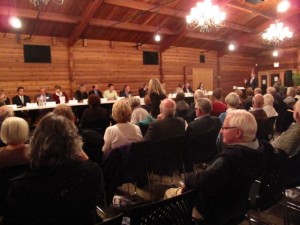To The Graduating Class of 2013
My remarks to the Sentinel Secondary School graduating class of 2013. Another version of this presentation was delivered to the Rockridge graduating class on May 17, 2013. This is a full transcript of my words and as is typical with verbal presentations, adjustments and/or changes may have been made while speaking.
Thank you. Merci.
I’m so pleased to be here tonight. Je suis très heureuse d’être ici avec vous ce soir.
On behalf of the West Van Board of Education, my congratulations to all this year’s graduates. Félicitations!
I know many of you are wondering who is this talking head and why does she get to speak at my grad?
Well, in the November 2011 municipal elections I and four others were elected by West Van residents to serve as Trustees on the Board of Education.
That means my colleagues and I help to oversee the public education system in our community and that along with your teachers, the staff at the school and the district, parents and yourselves, we have a measure of responsibility and accountability for your education from kindergarten through to Grade 12.
I also happen to be a graduate of school district 45.
Even though I’ve been around the District on and off since I was twelve, and even though I’ve been to Sentinel a number of times, I wanted to get a better feel for the school and its students before I spoke tonight.
I phoned up Principal Mike Finch and asked if we could tour the school together. And we did. I got to see some of you at work and some of you at play. I had a look into many of the classrooms and then I asked Mr. Finch to tell me about you, to tell me about students at Sentinel.
I’m just gonna give you a moment to think about what he told me.
No, he didn’t say that. Oh, he’d never say that, would he? No way. Uhuh.
What he did tell me is how impressed he has been by the students at Sentinel. How dedicated you are and how motivated you are to succeed on your own terms whether you’re studying French, pursuing your athletic interests in the academies, or being super achievers.
Barb Sunday, one of your amazing art leaders told me during my visit to the school, that she’d sent off about 50 advanced placement art portfolios for consideration. 50! And if you stop by the Ferry Building Gallery at the foot of 14th Street, you’ll see some of that art on display.
What you’ll also see there is the commitment you’ve made to pursuing your passions and the care you’ve taken to excel in the work you do.
And tonight we’re here to celebrate your accomplishments.
For parents, it’s a bittersweet moment, likely tinged with a sense of relief! Tonight is a chance to celebrate the wonderful individuals you’ve become and yet we also have to be prepared to let you go.
That’s what parents do.
And like parents, the teachers, the administration, and all the staff of the West Van school district – even Trustees, we all have to do our best to make sure you grads have the skills and talents you need to continue to succeed. And now you’re moving on.
But it’s not easy as parents or teachers or administrators to let you go because we know that the journey can sometimes be a challenge.
I would like to share with you some words by the Lebanese poet Kahlil Gibran. In his poem on children, he writes:
Your children are not your children.
They are the sons and daughters of Life’s longing for itself.
They come through you but not from you,
And though they are with you yet they belong not to you.
You may give them your love but not your thoughts,
For they have their own thoughts.
You may house their bodies but not their souls,
For their souls dwell in the house of tomorrow, which you cannot visit, not even in your dreams.
As Gibran says, you, our graduates, you live in tomorrow and we are not here to stand in your way.
You’ve worked hard or maybe you haven’t. You’ve had good days and bad. You’ve made friends, you’ve lost friends. You’ve studied, you’ve learned. You’ve been on a journey and now you’re set for the next stage of life whatever that may be for you.
And what do you need to successfully navigate what’s ahead?
To borrow the words of Canadian musicians David Myles and Classified, you need to embrace your inner ninja.
Be fierce and determined and passionate. Dream big and take action.
Stand up for yourself. More importantly, stand up for others.
Stand up for what you believe. More importantly, be tolerant and allow others to speak up for what they believe.
Stand up for what is right. More importantly, be open to different views and adjust your ideas if warranted.
And finally, Sentinel grads, take all that we — the community, the school District, the administration, your teachers, and your parents — take all that we have given you, take all that you are, and make the world you are inheriting, make it better.
Make the world better for you, for me, and for those who have so much less than either of us.
I know you can do it. I know you can do it.
Thank you and bonne chance!
Being Human and the Loss of Perspective in Politics
Errare humanum est [To err is human]. – Anonymous: Latin
For to err in opinion, though it be not the part of wise men, is at least human. – Plutarch (46-120 C.E.)
I presume you’re mortal, and may err. – James Shirley (1596-1666)
To err is human, to forgive divine. – Alexander Pope (1688-1744)
Then gently scan your brother man,/ Still gentler sister woman;/ Though they may gang a kennin’ wrang. To step aside is human. – Robert Burns, Address to the Unco Guid [1787]
“Address to the Unco Guid’ makes the point that it is this natural sympathy and compassion that is important in society: not self-righteous condemnation.” – Juliet Linden Bicket
I remembered Alexander Pope’s words this week as I watched events unfold in the BC provincial election. When I checked my copy of Bartlett’s Familiar Quotations to verify them, the footnotes led me to other quotes on the same theme and to Google for the full text of the Burns poem where I found the comment by Bicket.
And despite these wise words, which span approximately 2,000 years of human history, it would seem that in our time the motto has become “to err is human and to forgive is impossible”.
Or maybe even more to the point, “to err is human and let’s make sure everyone’s mistakes are never forgotten”.
And given our rush to judge others on this principle, it seems to me that the greatest disincentive to running for public office has become the process of getting elected.
While this trend has been emerging over time, it seems to have bloomed with noxious fervour in this election.
We’re all on the lookout for “bozo eruptions”. That’s the term applied to the actions of candidates who slip up in real time, but everything has become fair game: whether a word that’s said today or over 20 years ago, whether a misstep now or one from long ago.
And I have to ask what added value, if any, is there in this “new” way of doing politics. Does it benefit voters? Does it allow society to progress? Does it ensure the health and vitality of our democratic institutions?
Why?
Because we have made perfection a condition of holding office and yet no one is perfect. It’s not human.
Because we have lost perspective. If anything from any point in our lives can be construed as a liability, then we lose the ability to distinguish between misdemeanors and serious crimes.
Because we have forgotten that living involves choices and that we sometimes make bad choices, particularly when we’re young. But we learn and those mistakes do not necessarily or automatically make us incapable, incompetent, or untrustworthy for life.
Because setting up impossible standards for conduct and behaviour lead to unreasonable controls being implemented to maintain power once it’s been secured.
And that’s why we have a parliament full of men and women commonly derided as trained seals.
We have parliaments and legislatures which we denigrate and political representatives whom we disrespect. We have governments, political parties, and candidates who are more focused on slander and defamation, on digging up the dirt, than they are on policy and good governance.
And that’s an unforgivable mistake.
Connections? Priceless
In today’s opening essay for Q, the CBC radio show, host Jian Ghomeshi remembered Roger Ebert and the interview he conducted with the famed film critic a year ago.
Jian described how concerned he’d felt about his ability to connect with Mr. Ebert in the studio given the latter’s health challenges. “I needn’t have,” he said.
His words this morning paid tribute to the man, but they also served as a testament to the power of connection.
Listening to Jian made me reflect on my own feelings now that the spring term at SFU is drawing to a close. I’m not completely disentangled from my teaching obligations yet: I’m expecting final essays from my students next week.
But there are no further lectures for the course and no remaining tutorials. And that makes me wistful.
Why?
Because the end of the term represents a loss. The connections I’ve forged with my students after thirteen weeks of working together are now tenuous if not severed. I may have gained back time for my own work and my other commitments, but I am no longer a part of these particular journeys, the unfolding lives of these particular individuals.
Since my first stint as a TA, I’ve connected with approximately 120 students. 120 students from a variety of faculties and departments, given the way course requirements are structured at SFU, and 120 students who represent the gamut of undergraduate experience.
Aside from the occasional encounter on campus, I don’t know where they are now or what they are doing or how they are faring.
When I walk around the Burnaby campus now, a movie reel of sorts plays out in my mind: momentary flashes of memories, frames filled with faces, snippets of conversations, disappointments, and noted accomplishments.
The characters of my movies are students: those with strong opinions, those with a sense of humour, those who struggled, those who exceeded their own expectations, and those who were observers yet offered so much when they found the courage to voice their opinions.
The plot revolves around classic texts of Western civilization and delving for insights into the human condition, then and now. Work on writing, developing critical thinking skills, and trying my best to impart the importance of questioning.
A few students have reconnected via LinkedIn and others lurk on Twitter, but these electronic tentacles, in my mind, pale in comparison to the strength of the collective experience of an in-person weekly seminar or a personal visit during office hours.
My experience at SFU has strengthened my belief that the most critical factor in teaching and learning is the personal aspect. Technology may carry us forward into a brave new world where the nature of human interaction is fundamentally altered forever, and learning is transformed into something which I am not yet able to imagine, but for now it remains as it always has been.
The value of educational experiences rests predominantly, as it does for radio interviews, on human connections.
What Does It Mean?
Stepping into a profession, we can expect to be bombarded by acronyms and terms specific to that field. The BC public education system, for example, is rife with them: MoE, BCSTA, BCPSEA, BCSSA, BCASBO, BCTF, CUPE, BCCPAC, HR, F&F, AFG, AbEd, IB, PYP, MYP, IEP, FSAs, standardized testing, needs assessment, self-regulation, special needs, 21st century learning, etc.
Amongst the list of terms is one used to describe the model in which Boards of Education and the provincial government function: co-governance.
But what does co-governance mean?
I decided to look it up and started with the word governance. Here’s what I found:
governance:
- government; exercise of authority; control.
- a method or system of government or management.
And “co-”? It’s apparently a variation of “com-” which is defined as follows:
a prefix meaning “with,” together,” “in association,” and (with intensive force) “completely,” occurring in loan words from Latin (commit): used in the formation of compound words…
Putting the two together, I can say co-governance is a shared exercise of authority, control exerted in association with one another, or a partnership system of government or management.
Defining the term is easy, but applying it to BC’s public education system, as currently structured and operating, may be a misnomer.
Why?
Because the inherent nature of the relationship is one of imbalance. Public education is financed by public revenues which are allocated by the province.
And if one party in a relationship is the ultimate arbiter of funds, then it may be a challenge to ensure that other critical issues are addressed on the basis of a co-governance model. In the past few weeks alone, we’ve seen the release of a 10-year framework for bargaining as well as the debut of a new website, mostly with little or no direct consultation with Trustees.
I’ll admit it’s not easy when one has a firm grasp of the purse strings to share control, but the current structure is paternalistic and does not lend itself easily to a co-governance model.
And while my call for a Royal Commission on Education is likely to continue falling on deaf ears, here are two things I’d like to see.
First, I would like all eligible voters in BC to vote in the May 14 provincial election no matter what their political persuasion.
Second, I would like the new government, whether Liberal, NDP, Green, Conservative, or other to convene a meeting with Board of Education Trustees. Maybe two from each district. That’s a group of 120 people.
And talk.
Have a real discussion.
A substantive discussion.
One where Trustees do most of the speaking and elected officials and Ministry representatives do the listening.
And then do the same with each significant group in the education sector.
Compile the results of these discussions, distribute the report, and then put everyone in a room together to see if we can work together to ensure that our children will continue to benefit from a vibrant and thriving public education system.
One that is not characterized, if I may borrow from the philosopher Hannah Arendt, by questions of “what are we fighting against”, but “what are we fighting for?”.
And let’s see, if through dialogue, we can put the “co-” back into “co-governance”.
Female Bullying: The Cruelty of Exclusion
“Even bullies wear pink shirts on pink-shirt day.”
I heard this sentiment expressed more than once this past week. And to a certain extent it’s true. It’s a day when we offer camouflage to those who don’t realize they are the bullies we’re talking about.
Even so, the day does shine a light on the topic. It inspires people to share their own experiences as Shane Koyczan has done this year with his spoken word poem (link below).
As my friend Bob has done on his blog.
And as I want to do here because sharing our stories helps to build awareness.
I won’t address overt bullying such as when the boys in high school taunted me with choruses of “areema, areema, areema” from the back of the class or a girl slapped me or another taunted me about the strap on my training bra.
I want to talk about the peculiarly female form of bullying which isn’t dealt with by initiatives such as pink-shirt day.
Why?
Because the majority of female bullying is insidious.
Women tend to organize in circles.* Girls refused entry into the circle or who have been dismissed from it are the ones, I would argue, who are often subject to bullying because they are isolated and excluded.
I was a new kid in Grade 8, my family having just moved to West Vancouver. Fortunately a strong friendship helped me survive the transition, but the friendship dissolved the following year and it was difficult to replace.
My memory of Grade 9 is one of tears: tears shed because I was always on the edge of the group. Sitting in the hall at lunch, for example, listening while the other girls made plans for the weekend and not being invited to participate.
Tears shed because I was alone.
In my second year at UBC, I joined a sorority. In hindsight, it may not have been the best fit for me. If being on the outside of the circle in high school is difficult, falling out of favour in a group of 40 or so is excruciating.
I remember carpooling with two of my sorority “sisters” although as I reflect on it today, I realize I must have done all the driving because I was the one with the car. On the way home one afternoon, we hatched a plan to get together later to watch a movie. I dropped them off and went home to get ready, sitting by the phone waiting for the call (yes, that’s how it was done in those days!). The call did come, but to cancel. Secrets are very hard to keep though and I found out later that the get-together had gone ahead as planned, but without me.
Trying to understand, I asked. The explanation? “Reema, when you ask someone how they are, you really mean it.” In other words, being with me was work. My interaction with others was based on more than a flippant line or light-hearted gossip or trivial talk.
I still am work and when I ask someone how they are, I still really mean it. My interest is in the whole person and their truth, not simply the mask presented to the world. I am a little too earnest to fit in easily and that has often put me, continues to put me, outside the circle.
But with the passage of time and the wisdom of experience, comes strength and acceptance, and a circle of true friends including that friend from Grade 8 whose friendship was reclaimed and a few from those sorority days.
It does get better, but it is never forgotten and it is not always easier.
Bullying requires constant and persistent vigilance, and that’s why it’ll never be eradicated simply by wearing pink one day a year.
*From the work of Deborah Tannen which I was introduced to in a writing workshop many years ago.
Three videos which touch the heart and mend the soul:
“It Gets Better” (Broadway sings for the Trevor Project)
It Gets Better – Royal Canadian Mounted Police (BC)
An informative interview on the topic of bullying:
Author Emily Bazelon on CBC’s Day 6




